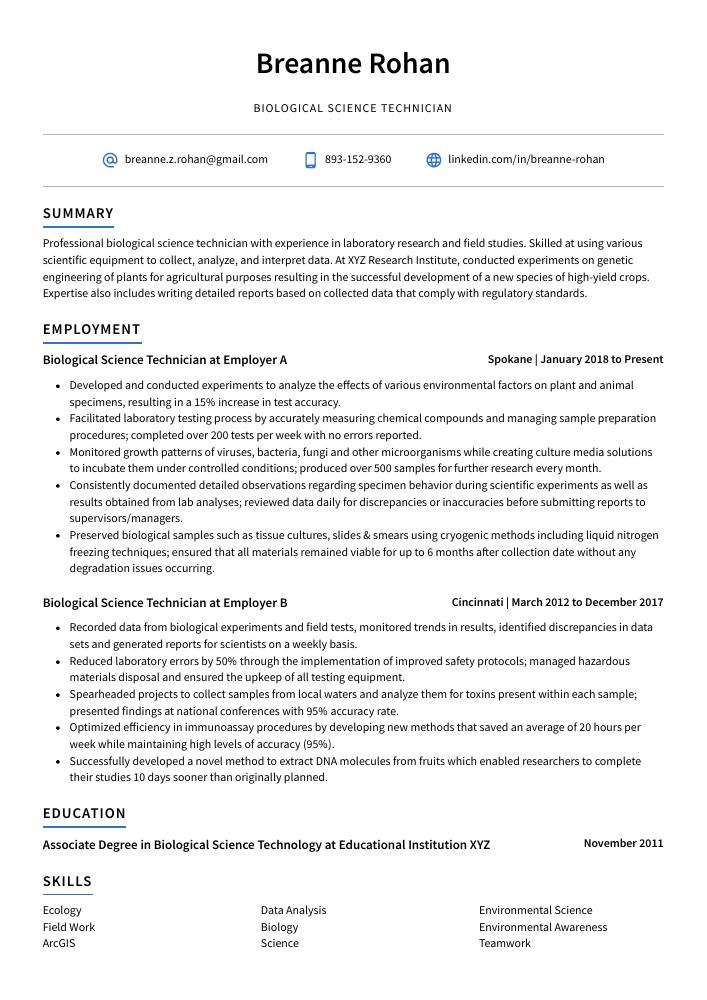Biological Science Technician Resume Guide
Biological Science Technicians help scientists conduct laboratory tests, analyze data and maintain research records. They also perform experiments to test the validity of scientific theories and gather samples from various sources for study. In addition, they may assist in preparing specimens for examination or dissection by researchers.
You have the knowledge and skills to make an excellent biological science technician, but hiring managers don’t know it yet. To get them interested in your candidacy, you must craft a resume that highlights your qualifications for the job.
This guide will walk you through the entire process of creating a top-notch resume. We first show you a complete example and then break down what each resume section should look like.
Table of Contents
The guide is divided into sections for your convenience. You can read it from beginning to end or use the table of contents below to jump to a specific part.
Biological Science Technician Resume Sample
Breanne Rohan
Biological Science Technician
[email protected]
893-152-9360
linkedin.com/in/breanne-rohan
Summary
Professional biological science technician with experience in laboratory research and field studies. Skilled at using various scientific equipment to collect, analyze, and interpret data. At XYZ Research Institute, conducted experiments on genetic engineering of plants for agricultural purposes resulting in the successful development of a new species of high-yield crops. Expertise also includes writing detailed reports based on collected data that comply with regulatory standards.
Experience
Biological Science Technician, Employer A
Spokane, Jan 2018 – Present
- Developed and conducted experiments to analyze the effects of various environmental factors on plant and animal specimens, resulting in a 15% increase in test accuracy.
- Facilitated laboratory testing process by accurately measuring chemical compounds and managing sample preparation procedures; completed over 200 tests per week with no errors reported.
- Monitored growth patterns of viruses, bacteria, fungi and other microorganisms while creating culture media solutions to incubate them under controlled conditions; produced over 500 samples for further research every month.
- Consistently documented detailed observations regarding specimen behavior during scientific experiments as well as results obtained from lab analyses; reviewed data daily for discrepancies or inaccuracies before submitting reports to supervisors/managers.
- Preserved biological samples such as tissue cultures, slides & smears using cryogenic methods including liquid nitrogen freezing techniques; ensured that all materials remained viable for up to 6 months after collection date without any degradation issues occurring.
Biological Science Technician, Employer B
Cincinnati, Mar 2012 – Dec 2017
- Recorded data from biological experiments and field tests, monitored trends in results, identified discrepancies in data sets and generated reports for scientists on a weekly basis.
- Reduced laboratory errors by 50% through the implementation of improved safety protocols; managed hazardous materials disposal and ensured the upkeep of all testing equipment.
- Spearheaded projects to collect samples from local waters and analyze them for toxins present within each sample; presented findings at national conferences with 95% accuracy rate.
- Optimized efficiency in immunoassay procedures by developing new methods that saved an average of 20 hours per week while maintaining high levels of accuracy (95%).
- Successfully developed a novel method to extract DNA molecules from fruits which enabled researchers to complete their studies 10 days sooner than originally planned.
Skills
- Ecology
- Data Analysis
- Environmental Science
- Field Work
- Biology
- Environmental Awareness
- ArcGIS
- Science
- Teamwork
Education
Associate Degree in Biological Science Technology
Educational Institution XYZ
Nov 2011
Certifications
Certified Biological Science Technician
American Society for Clinical Laboratory Science
May 2017
1. Summary / Objective
A resume summary/objective is like a movie trailer – it provides the hiring manager with essential information and should compel them to read on. In your summary, you can highlight the skills that make you an ideal candidate for this position such as experience in laboratory techniques, knowledge of safety protocols, and proficiency in data analysis software. You could also mention any certifications or awards related to biological science that demonstrate your commitment to excellence.
Below are some resume summary examples:
Proficient Biological Science Technician with 7+ years of experience providing laboratory and field support for various research projects. Skilled in data collection, analysis, and reporting to provide timely feedback on project progress. At XYZ Research Institute, improved accuracy of results by 20% through the implementation of innovative testing protocols. Seeking to bring my expertise to ABC Lab as a Biological Science Technician and help advance scientific discoveries.
Seasoned biological science technician with 5+ years of experience in a variety of research labs. Experienced in both wet and dry lab techniques, data collection and analysis, as well as running complex experiments. At XYZ University, managed the laboratory facility for 4 professors while contributing to 10 published papers on topics ranging from cancer biology to genetics. Proven ability to work independently or collaboratively within a team environment.
Driven biological science technician with 5+ years of experience in laboratory and field settings. Possesses a strong understanding of the scientific method, including data collection, analysis and interpretation. At XYZ Lab, managed sample testing for 20 clinical trials while ensuring accuracy and compliance to regulatory standards. Highly skilled at collaborating effectively with cross-functional teams to ensure delivery deadlines are met on time.
Committed biological science technician with 5+ years of experience working in laboratory settings, collecting and analyzing samples, developing protocols, and creating reports. Adept at troubleshooting when required to ensure accurate results are obtained. Looking to join ABC Corporation as a biological tech where I can apply my expertise towards the development of new methods for improving quality control procedures.
Diligent and detail-oriented biological science technician possessing over 5 years of laboratory experience. Experienced in conducting experiments and collecting data related to biology, chemistry, genetics, and biochemistry. Adept at maintaining accurate records and utilizing various lab equipment with precision. Proven track record of providing support for the development of new medical treatments.
Well-rounded biological science technician with 6+ years of experience in laboratory research, data analysis and reporting. Seeking to join ABC Labs as a biological science technician where I can utilize my expertise to help create innovative solutions for the company’s clients. In previous roles, successfully conducted experiments that led to two patents being granted.
Enthusiastic and detail-oriented biological science technician with over 5 years of experience in laboratory settings. Seeking to join ABC Labs and utilize expertise in collecting, analyzing and interpreting data for a wide range of scientific experiments. Key achievements include successfully creating an innovative protocol that increased lab productivity by 30%.
Reliable and hardworking biological science technician with 9+ years of experience in research and laboratory settings. Skilled at conducting experiments, collecting data, and analyzing results to develop scientific conclusions. Seeking a position as a Biological Science Technician at ABC Labs to use my expertise in support of the team’s research initiatives.
2. Experience / Employment
For the experience section, you want to list your employment history in reverse chronological order, with the most recent job listed first.
When writing up this section, use bullet points and provide detail about what you did and the results obtained. For example, instead of saying “Performed lab tests,” you could say something like “Conducted PCR assays on samples from clinical trials to identify genetic mutations associated with disease progression; accuracy rate was 98%.”.
This will give employers a better understanding of your skillset as well as how successful it has been for previous organizations or projects.
To write effective bullet points, begin with a strong verb or adverb. Industry specific verbs to use are:
- Analyzed
- Monitored
- Collected
- Cultivated
- Prepared
- Assessed
- Examined
- Operated
- Recorded
- Processed
- Isolated
- Identified
- Measured
- Preserved
- Dissected
Other general verbs you can use are:
- Achieved
- Advised
- Compiled
- Coordinated
- Demonstrated
- Developed
- Expedited
- Facilitated
- Formulated
- Improved
- Introduced
- Mentored
- Optimized
- Participated
- Presented
- Reduced
- Reorganized
- Represented
- Revised
- Spearheaded
- Streamlined
- Structured
- Utilized
Below are some example bullet points:
- Streamlined laboratory operations by organizing, setting up and maintaining laboratory equipment, resulting in a 30% improvement in efficiency.
- Measured the concentration of chemical compounds using advanced instruments such as mass spectrometry to identify contaminants; reduced false positives from 15% to 8%.
- Represented research team at local science events, delivering presentations on various topics related to biology 10+ times over the past year.
- Substantially increased accuracy of test results by developing new protocols for sample preparation and analysis while strictly adhering to safety standards set forth by the institution’s ethics committee.
- Processed 200+ biological samples each week according to established standard operating procedures (SOPs) with 100% compliance rate; improved turnaround time per project by 50%.
- Presented research findings on plant and animal cell biology to a professional audience of 50 biologists, resulting in successful grant funding for two new projects.
- Structured laboratory experiments within strict safety guidelines, performing 10+ tests per day with an accuracy rate of 95%.
- Efficiently managed the ordering and inventory tracking system for biological science materials; reduced spending by $4,000 last quarter through careful budgeting.
- Advised senior scientists regarding complex lab processes such as DNA extraction and gel electrophoresis; successfully completed 40+ laboratory protocols over 6 months period without any errors or delays in results delivery time frames.
- Operated advanced scientific equipment (e.g., microscopes) to analyze samples at both macroscopic and microscopic levels; identified 30% more anomalies than previous technicians working on similar tasks before relocation date.
- Utilized advanced laboratory techniques and equipment to analyze tissue samples, including microscopic examination of cells; decreased sample analysis time by 30%.
- Compiled data from experiments conducted in the lab, while ensuring accuracy with all measurements taken; ensured compliance with Good Lab Practice regulations.
- Reorganized complex sets of biological specimens for easy identification and retrieval according to established taxonomy classification standards, resulting in a 20% reduction in cataloguing errors.
- Confidently operated sophisticated computers systems such as C++ programming language and MATLAB software for data interpretation purposes; developed algorithms which increased experimental efficiency by 40%.
- Improved existing protocols related to cell culture maintenance through careful observation of specimen growth processes; resulted in low mortality rates among cultures maintained under specialized conditions (down 15%).
- Accurately conducted laboratory tests using advanced biological and chemical instruments, revising protocols to increase efficiency by 27%.
- Revised existing methods for data collection and analysis of experimental results; identified potential errors in test results before any further progress was made.
- Identified areas for improvement within the lab environment and successfully implemented changes that increased safety measures by 50%.
- Collected samples from various locations across the country for testing purposes; analyzed data to identify trends or patterns related to plant life cycles over time.
- Analyzed a wide range of specimens such as soil, water, air particles, bacteria cultures and animal tissue under microscope with accuracy; documented findings accurately in reports used by scientists in their research work activities.
- Coordinated the daily operations of a biological laboratory, overseeing the work of 10 technicians and ensuring that all experiments were conducted in accordance with established protocols.
- Meticulously maintained and calibrated lab equipment; achieved an accuracy rate of 95% for data entry when collecting samples from field sites.
- Achieved cost savings of $8,000 over 6 months by optimizing inventory management processes; improved supply stock rotation to reduce spoilage rates by 5%.
- Expedited testing results through development and implementation of new software programs which increased sample processing speed by 25%.
- Participated in various research projects as part of a team, contributing to the successful completion of 4 studies related to genetic engineering within 1 year’s time frame.
- Diligently dissected over 200 specimens for research purposes, ensuring accuracy and high attention to detail.
- Examined tissue samples under the microscope for further analysis; identified 15 unique biological markers with 100% accuracy in a 2-month period.
- Mentored 5 undergraduate students on laboratory techniques such as DNA extraction, protein purification and PCR amplification; implemented an effective training program that resulted in improved experimental results by 25%.
- Cultivated cell cultures from various species of microbes for drug discovery projects; successfully developed new strains of bacteria with increased antibiotic resistance at a rate of 1 strain per week.
- Analyzed biochemical data using advanced statistical models and software programs to support pharmaceutical scientists’ research efforts; reduced error rates by 35%.
- Formulated and tested new biological compounds to enhance research productivity, increasing overall efficiency by 40%.
- Introduced innovative methods of DNA extraction and analysis that improved accuracy and shortened the time needed for testing from 3 days to just 6 hours.
- Demonstrated advanced knowledge in cell biology, microbiology, biochemistry & molecular genetics when conducting experiments and analyzing results with a 98% success rate.
- Thoroughly documented all laboratory activities according to standard procedures; successfully identified 15 unknown bacteria specimens through careful observation techniques over 4 months of work.
- Prepared culture media solutions following strict safety protocols; maintained items like microscopes and other equipment used in lab tests while reducing maintenance costs by $1,500 annually on average.
3. Skills
Two organizations that have advertised for a position with the same title may be searching for individuals whose skills are quite different. For instance, one might be looking for someone with experience in laboratory work, while the other may require knowledge of field research.
It is important to tailor the skills section of your resume to each job you are applying for. This way, you can ensure that it contains all relevant keywords and phrases related to the position advertised by a particular employer.
Moreover, this will help applicant tracking systems (ATS) recognize your candidacy as an appropriate match for that specific role. You should also elaborate on these skills in more detail elsewhere on your resume – such as in the summary or experience sections – so employers have a better understanding of how they relate to their needs.
Below is a list of common skills & terms:
- Aquatic Ecology
- ArcGIS
- Biology
- Communication
- Conservation Issues
- Data Analysis
- Data Collection
- Data Entry
- Ecological Restoration
- Ecology
- Environmental Awareness
- Environmental Education
- Environmental Policy
- Environmental Science
- Field Work
- GIS
- GPS
- Laboratory
- Laboratory Skills
- Marine Biology
- Molecular Biology
- Natural Resource Management
- PCR
- Plant Identification
- Science
- Scientific Writing
- Statistics
- Sustainability
- Teaching
- Teamwork
- Technical Writing
- Time Management
- WILDLIFE BIOLOGY
- Water Quality
- Wildlife
- Wildlife Management
4. Education
Including an education section on your resume will depend on how far along you are in your career. If you just graduated and have no work experience, mention your education below the resume objective. However, if you have significant work experience to showcase, omitting an education section might be a better option.
If an education section is included, try to list courses or certifications related to biological science technician roles that demonstrate skills relevant for the job position.
Associate Degree in Biological Science Technology
Educational Institution XYZ
Nov 2011
5. Certifications
Certifications are a great way to demonstrate your expertise in a certain field. They can help you stand out from the competition and show potential employers that you have taken the time to hone your skills.
If you are applying for a job where certifications are required or preferred, make sure they appear prominently on your resume. This will give hiring managers confidence that you possess the necessary qualifications and knowledge needed for success in their organization.
Certified Biological Science Technician
American Society for Clinical Laboratory Science
May 2017
6. Contact Info
Your name should be the first thing a reader sees when viewing your resume, so ensure its positioning is prominent. Your phone number should be written in the most commonly used format in your country/city/state, and your email address should be professional.
You can also choose to include a link to your LinkedIn profile, personal website, or other online platforms relevant to your industry.
Finally, name your resume file appropriately to help hiring managers; for Breanne Rohan, this would be Breanne-Rohan-resume.pdf or Breanne-Rohan-resume.docx.
7. Cover Letter
Providing a cover letter with your job application is a great way to make yourself stand out from the competition. It may not be required for every role, but it’s always recommended as a means of introducing yourself and showcasing why you’re an ideal candidate for the position.
Cover letters are typically made up of 2 to 4 paragraphs that provide additional detail about who you are and what makes you suitable for the job at hand. They can also be used to explain any gaps in employment or other key points on your resume that need clarification.
Below is an example cover letter:
Dear Matt,
I am writing to apply for the Biological Science Technician position with New Parkland University. I am a recent graduate of the university’s Biology program and have previous experience working in a laboratory setting. In my current role as a research assistant, I work closely with senior scientists to collect data, maintain equipment, and organize specimens.
My coursework at New Parkland has given me a strong foundation in biology and related sciences. I have also gained valuable experience using scientific equipment and software applications. My attention to detail and ability to follow instructions will be an asset in this role. Additionally, my interpersonal skills will be helpful when working with other technicians and scientists on collaborative projects.
I am eager to utilize my skills and knowledge in a new environment. I believe that I can contribute to your team’s success by providing accurate results and helping to keep the lab organized. I look forward to speaking with you about this opportunity soon. Thank you for your time!
Sincerely,
Breanne
Biological Science Technician Resume Templates
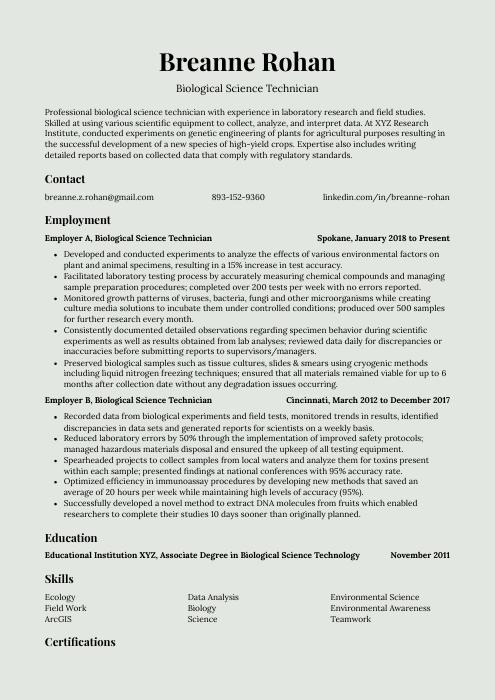 Saola
Saola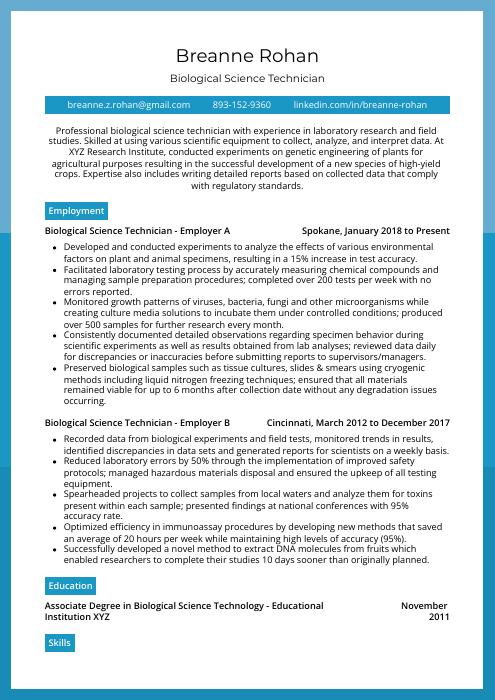 Rhea
Rhea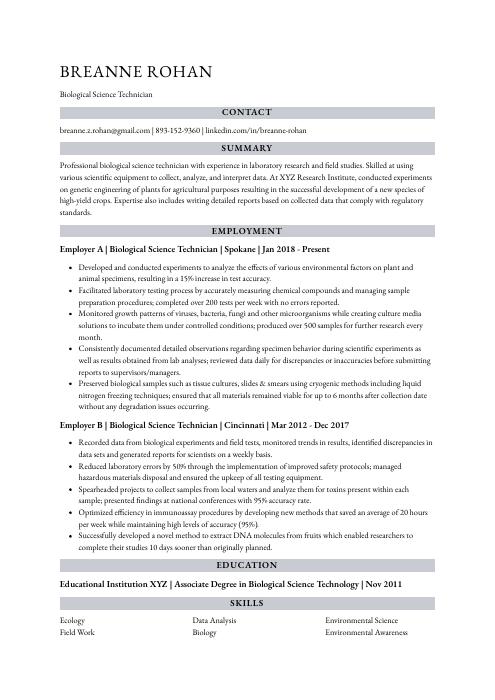 Numbat
Numbat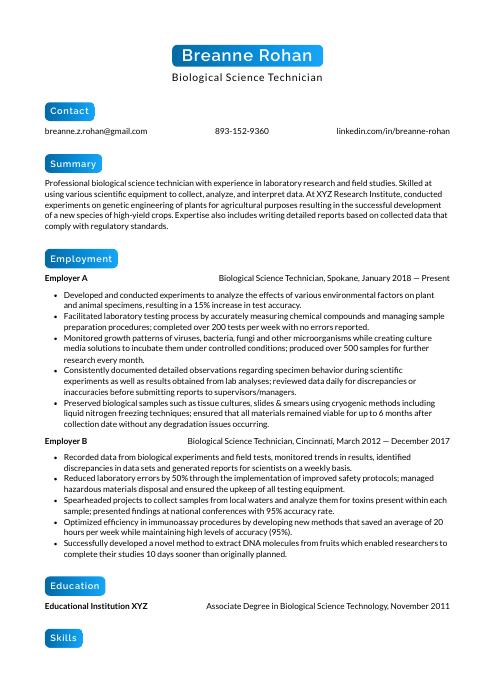 Kinkajou
Kinkajou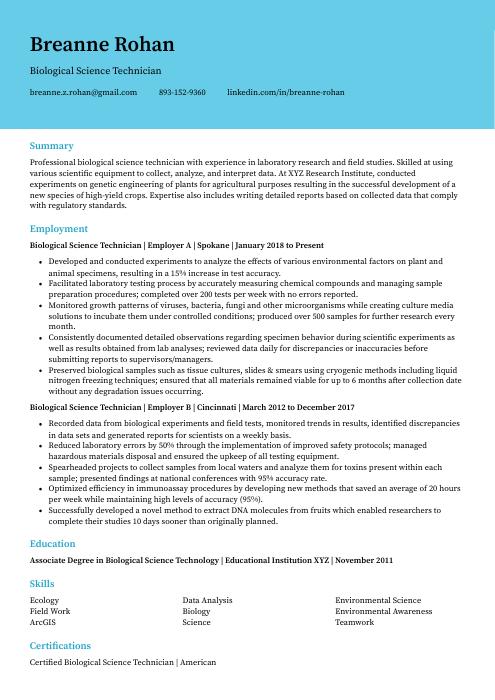 Dugong
Dugong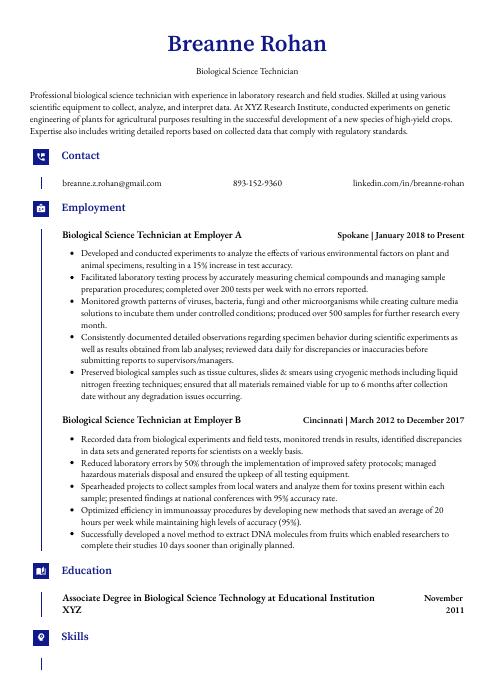 Gharial
Gharial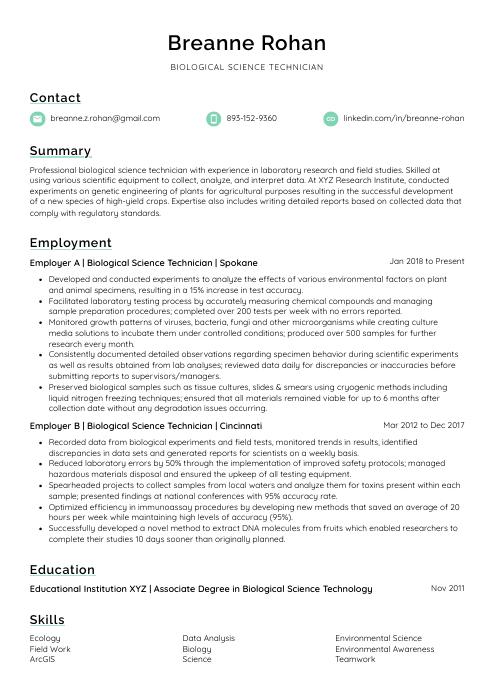 Lorikeet
Lorikeet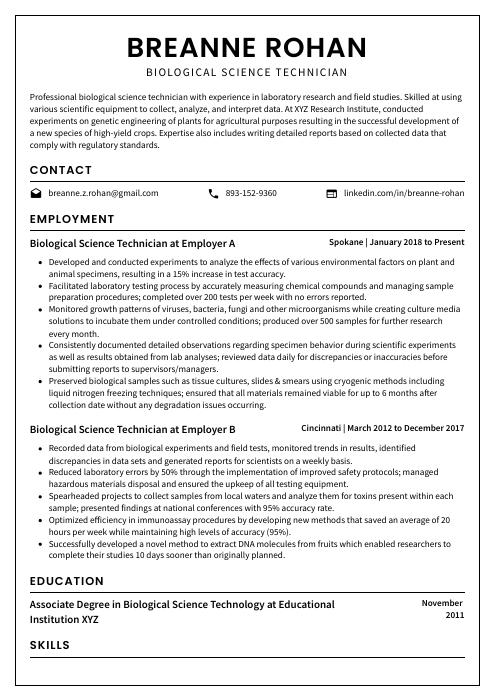 Cormorant
Cormorant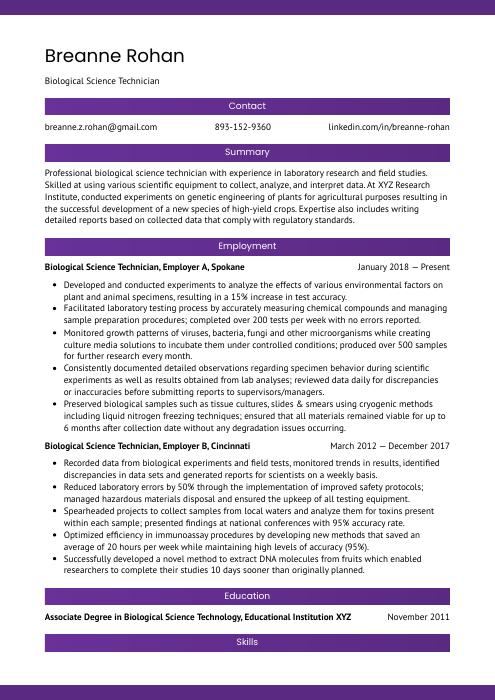 Jerboa
Jerboa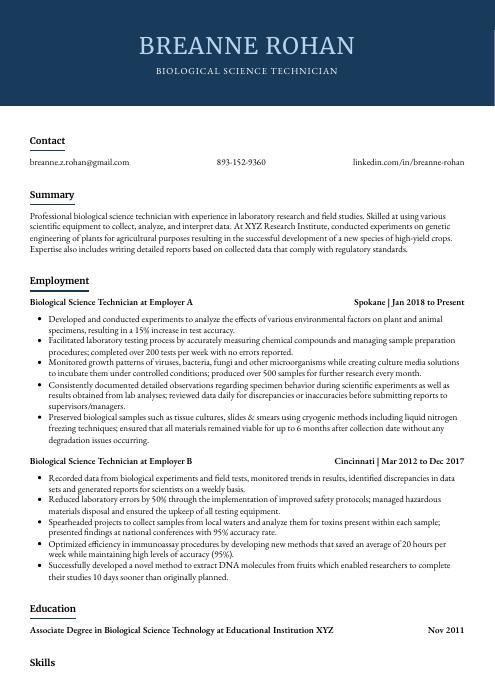 Bonobo
Bonobo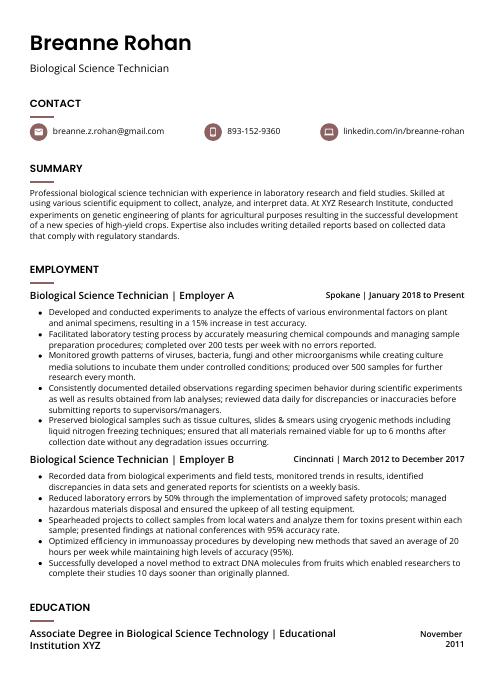 Fossa
Fossa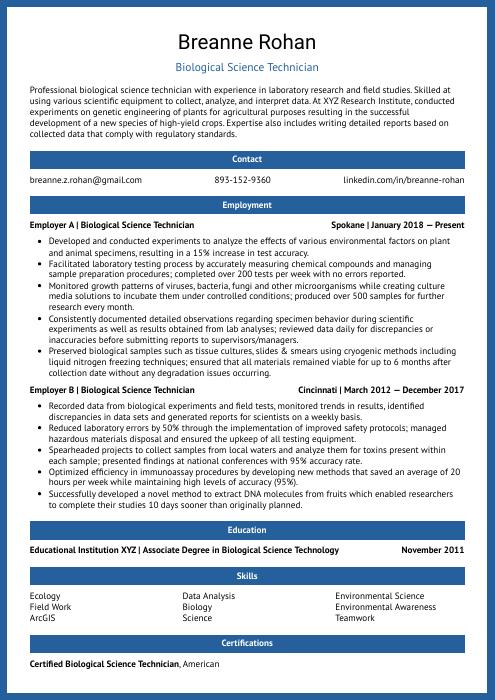 Ocelot
Ocelot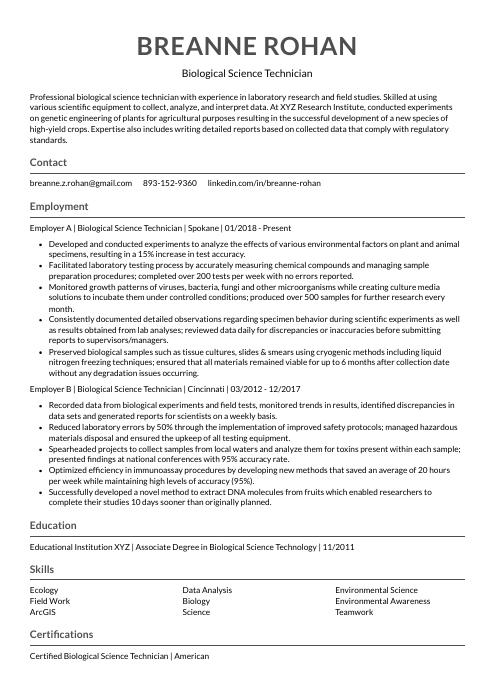 Indri
Indri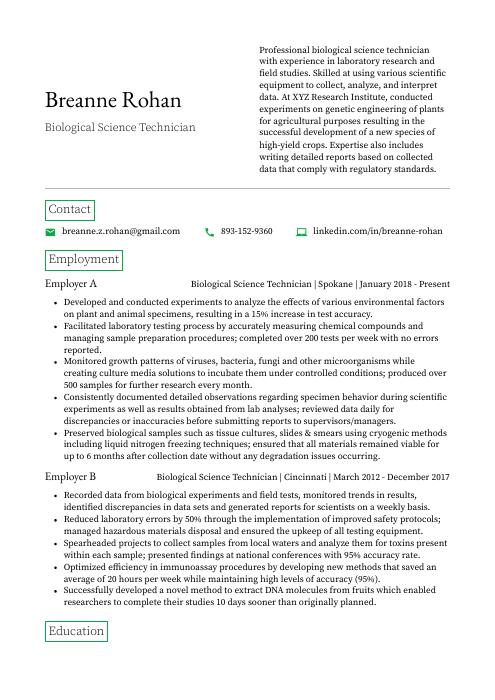 Quokka
Quokka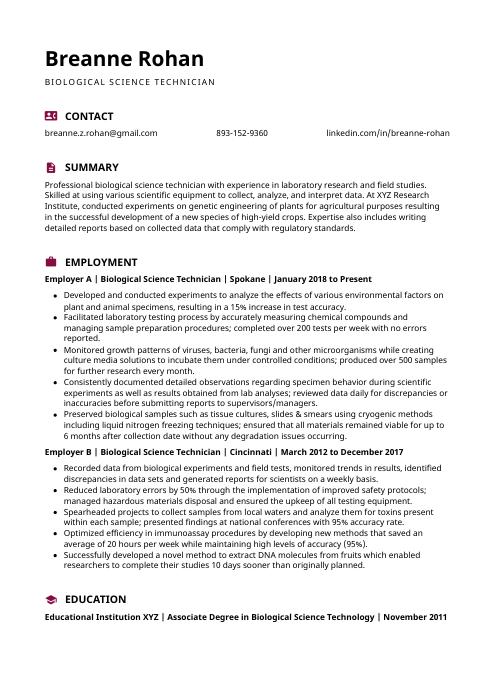 Hoopoe
Hoopoe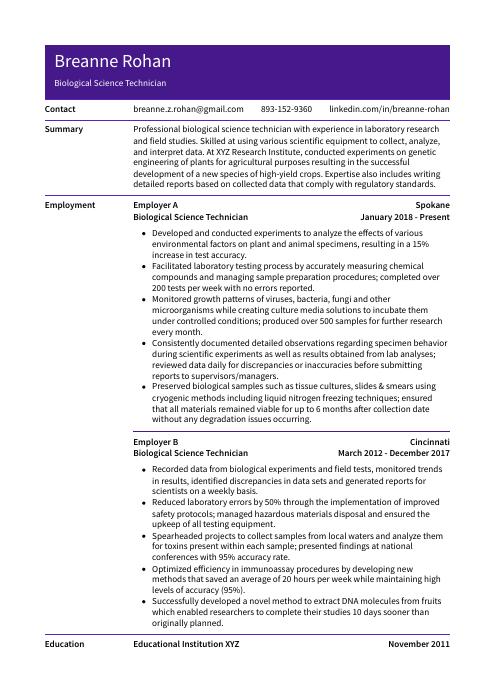 Pika
Pika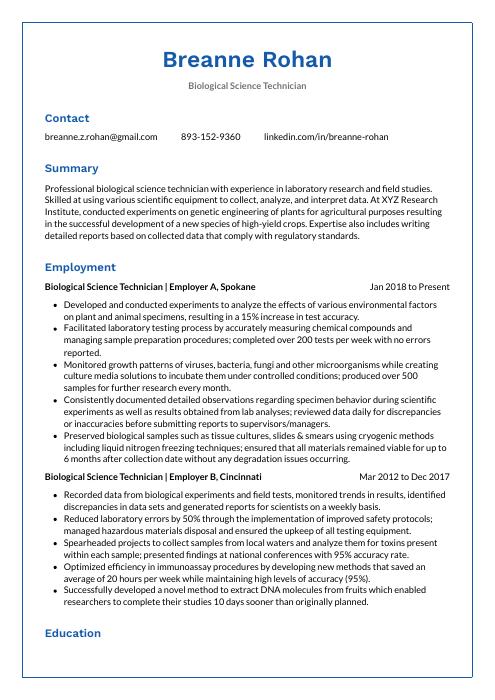 Markhor
Markhor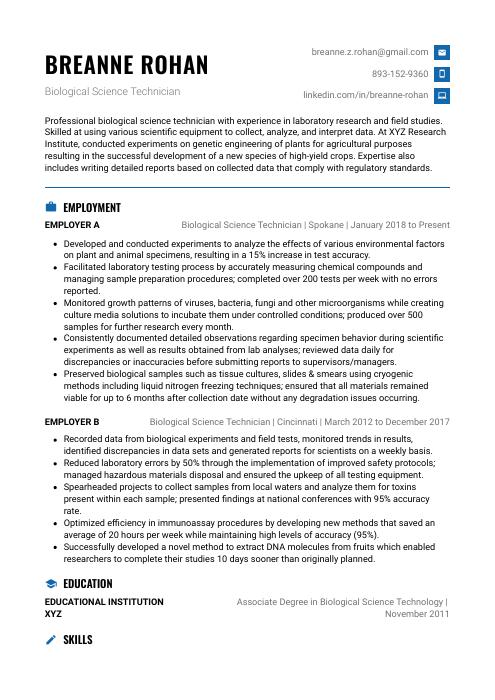 Echidna
Echidna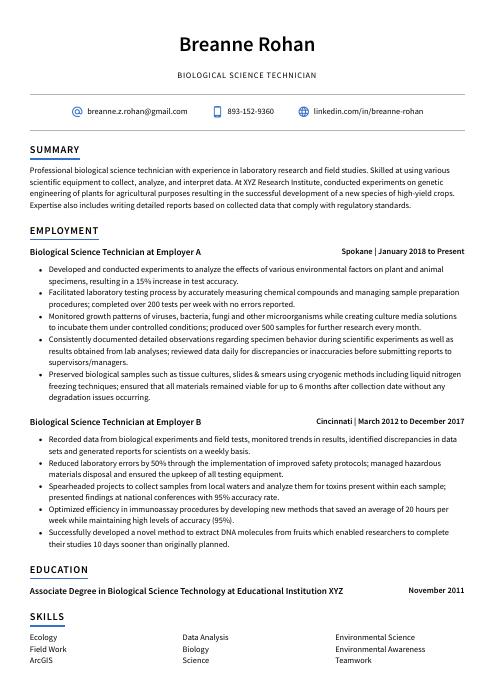 Axolotl
Axolotl Rezjumei
Rezjumei
